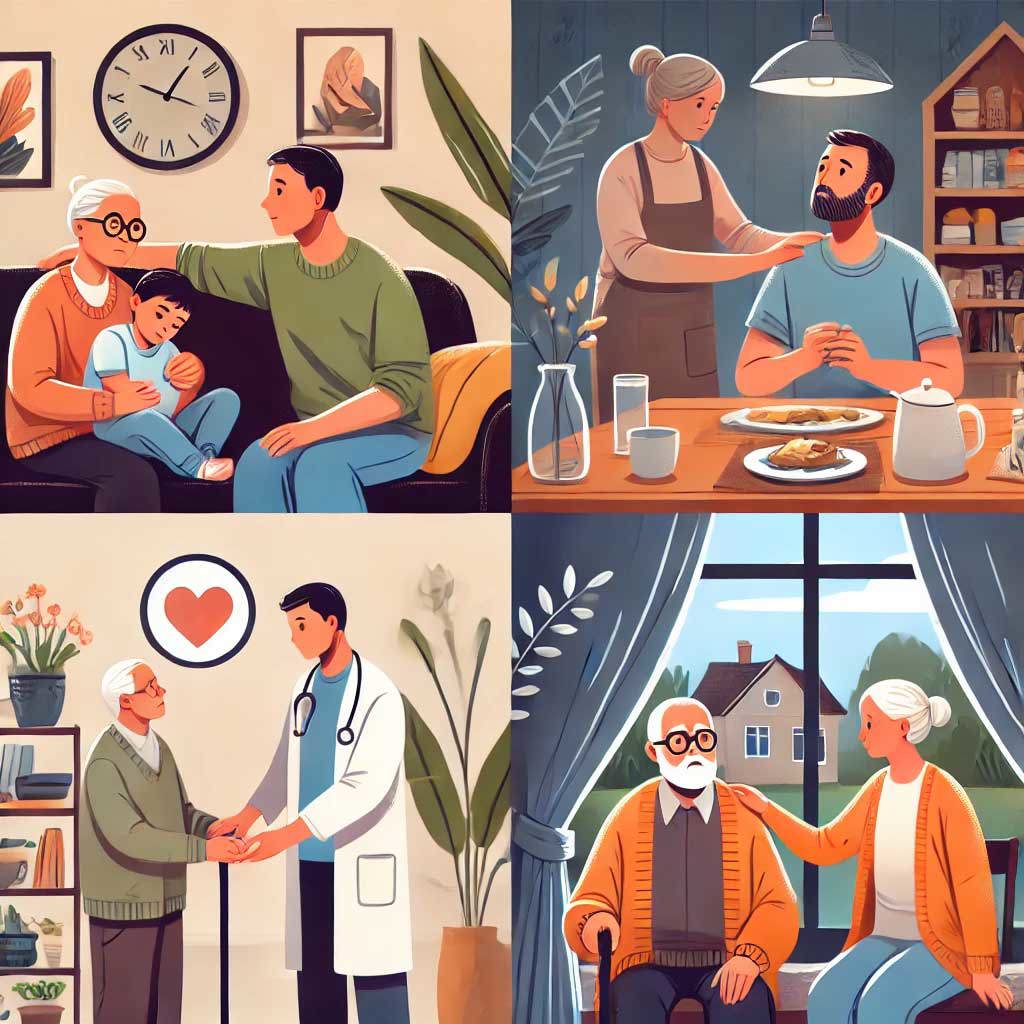Caring for grandparents: How can I help?
When love becomes responsibility
The Caring for Grandparents is often a true project of the heart - full of closeness, memories and connection. But as wonderful as this task can be, it can sometimes be quite challenging. Especially when several generations live together and different needs and everyday structures come together.
Maybe you are a grandchild or family member in the middle of this and ask yourself: How can I help without overwhelming my parents - or myself?
In this article, we show you how you can relieve your family with small and large gestures - lovingly, suitable for everyday use and without missing out yourself. Because good care is teamwork - and it works better together.
How you can relieve your family in the care of grandparents
1. Talk openly with your parents
Before you can help, you need to understand, how your parents are really doing. Sit down together, listen to each other and ask specific questions:
What is bothering you right now? Where would you like support?
An honest conversation is often the first step towards more relief and a stronger relationship.
2. offer concrete help
"Let me know if I can help" sounds nice - but often doesn't help in everyday life. Instead, think about:
- Can you take over childcare if you have a doctor's appointment coming up?
- Can you do the shopping?
- Jump in to cook or clean?
The more concrete your offer, the easier it will be for your parents to accept it.
3. don't forget yourself
As much as you want to help: Your energy is not infinite.Pay attention to your own limits - because you can only be there for others if you are well.
Consciously plan breaks, talk about your feelings and get yourself support when you realize: It's getting too much.
4. Get professional support
You don't have to do everything on your own. Via noracares you can, for example find a suitable caregiver for your grandparents - fast, uncomplicated and loving.
Mobile care services, Day care or substitute care can provide great relief. Find out about the options in your region early on.
5. Be patient - with others and with yourself
Caregiving is often not only physically, but also emotionally challenging - especially when illness or dementia are involved.
Trials, stay patient, even when the going gets tough. And remember: every step you take is a valuable contribution to your family.
A story from everyday life: When three generations stick together
Lena is 29 years old, lives in Graz and works full-time in marketing. Her grandmother Anna (84) has been living with her parents for a year - after a fall, she needed more support in her everyday life. Lena's parents take loving care of Anna, but sometimes Lena notices how exhausted her mother seems.
"I asked myself for a long time how I could really help," says Lena. "I no longer live at home, but every time I visited, I had the feeling that I was needed - but no one really said it."
So Lena has begun, to create little rituals that are good for everyone:
- Every Saturday, she cooks for everyone - including grandma's favourite dessert.
- Once a month she goes for a walk with her mother, just the two of them - to talk, laugh, switch off.
- She and her father have organized hourly childcare via noracares, which comes twice a week.
"Everything has been more relaxed since then. I know that I don't have to do everything - but I can still make a big difference," says Lena. "And my grandma? She looks forward to her apple strudel every week."
Systematic support: What the state and care organizations offer
If you want to relieve your parents of the burden of caring for your grandparents, it doesn't always have to be on your shoulders. In Austria and Germany, there are numerous government-funded programs, advice centres and care aids that strengthen families - often many just don't know about them.
1. Use care allowance - but the right way
In Austria as well as in Germany, people in need of care are entitled to financial benefits from the Pflegegeld (Austria) or die Pflegeversicherung (Germany).
- In Austria the nursing allowance already from level 1 can be applied for. The amount depends on the level of care required (As of 2025: between €180.40 and €2,061.80 per month)
- In Germany there are from level-of-care 2 monthly care allowance from €332 to €947 (as of 2025) for home care.
If you want to know, how care levels in Austria and care grades in Germany differ, you will find helpful explanations in our blog articles - presented in a simple and understandable way. So you know exactly what support you or your grandparents are entitled to.B. for hourly help, everyday support or accompanying them to appointments.
2. care courses & digital support for relatives
Care can be learned - and it's even offered free of charge. In both Germany and Austria, there are Care courses for relatives, which will provide you with important knowledge about personal care, Dementia care or arrange communication with people in need of care. Important points of contact:
- Austria: The Pflegeberatung der Bundesländer, e.g. in Vienna via the . For example, in Vienna via the "Nursing at home"program or the Red Cross Care Assistance Center
- Germany: Pflegekassen offer free care courses - also digitally via platforms such as Familienpflegezeit.de or Pflegen-und-leben.de
3. caregiver leave and family time bonus
Working relatives must not provide care in silence - there are legal options for taking time out:
4. claiming respite services
In both countries you Relief amounts if you care for a relative at home.
-
In Germany receive care from Care level 1 monthly 125 € relief amount, which can be used for home help, companionship services or everyday support【Source: Care Insurance 2025】.
- In Austria promote many federal states mobile services, visiting services or day care services, which you can take advantage of by the hour - often with staggered rates depending on income【source: Pflegeinfo.gv.at】.
5. get advice - anonymous, professional and free of charge
Don't know where to start? Are you emotionally overwhelmed or just want to talk things out? In such cases, there are qualified advice services for family caregivers - by phone, on site or online: Advice centers 2025:
- Austria: Pflegehotlines der Länder (z. e.g. oesterreich.gv.at/pflegeberatung)
- Germany: Care counseling according to §7a SGB XI via the long-term care insurance funds or independent bodies such as the Unabhängige Patientenberatung Deutschland (UPD)
-
noracares Newsletter:Always up-to-date with new funding, relief offers and real stories from the world of care.
Together strong - for our grandparents
Caring for grandparents is an expression of deep connection - but it doesn't have to be a burden. You don't have to do everything on your own, and it's not a sign of weakness to ask for help. On the contrary: talking to the family early on, sharing tasks and asking for support not only strengthens yourself, but also family togetherness.
Whether it's hourly care, financial support, care courses or digital offers - there are many ways in which you can make your contribution without losing yourself. And that's exactly where noracares - with a platform that connects you with love, qualified caregivers together.
Because good care needs heart - and a strong team at your side.
- Nursing allowance - Financial benefit in Austria for people with care needs - graded into 7 levels of care.
- Maintenance level - German classification of care needs into 5 care levels - the higher the level, the higher the support.
- Replacement care - Temporary replacement for family caregivers - e.g. during holidays or illness. e.g. during vacation or illness.
- Relief amount - Monthly amount in Germany (€125 from care level 1) to finance household help or everyday assistance.
- Nursing leave / Family care leave - Right to temporary leave of absence from work to care for a relative in Austria (care leave) or Germany (family care leave). Germany (family care leave).
- noracares - Digital platform for the direct placement of qualified caregivers - human, flexible and without agency costs.





